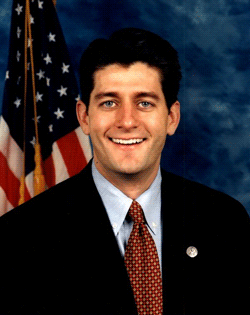
Of all the new faces in the new House of Representatives, the only one — so far — to not speak the Republican dialect of “Washingtonspeak” is Paul Ryan, of Wisconsin. Ryan has been in Congress for a decade, but he’s about to become a lot more influential. Ryan is going to be chair of the House Budget Committee, where most of the decisions about government spending are made. Of course he’s subject to the veto of the socialist President and the idiots who still largely run the Senate. But his influence counts, at least if he adheres to rational principle (admittedly a first for any Republican).
Congress was set up by our Founders to hold the “power of the purse” and much of that purse string is controlled by Rep. Ryan. I watched him in a post-election interview. I found no double-talk. He simply kept saying over and over again, in essence, that we’re going to reverse course: Instead of increasing spending, we’re going to decrease it. In fact, he proposed a “diet” of spending cuts every single week. This is the kind of thing I wanted to see. What we need is a bidding war to reduce spending. The interviewer, of course, balked at the idea of spending cuts. “What? You’re going to cut departments in the FBI? And Health and Human Services?” Ryan correctly replied that there won’t be a government — or an America — if we keep traveling on the path we’re on. The only solution, he said repeatedly, is to reverse course.
If Ryan stays on that path, he will enjoy my support and praise. He can’t control what happens in the Senate, and he can’t be responsible for what tricks Nancy Pelosi (the Wicked Witch who won’t put down her broom) and Barack (the unrepentant socialist) have up their sleeves. But at least somebody, somewhere, will stand for something and it will be the right thing. I fully recognize that Ryan might buckle like all the others. But here’s hoping that he doesn’t. If there’s only one member of Congress who stands for principle — the right principle, for a change — then this has more significance than the dozens or hundreds of dolts who stand for nothing, or for the wrong thing. If the right thing wins today, it can win even bigger tomorrow.
Sometimes the best way to know somebody is to consider what their enemies have to say about them. Liberal Democratic economist Paul Krugman took issue with the claim that Ryan’s proposals would reduce the deficit, alleging that Ryan only considered proposed spending cuts and failed to take into account the tax changes. Ryan’s plan “would raise taxes for 95 percent of the population” but claimed the tax cuts for the rich would be large enough to produce a $4 trillion revenue loss over ten years. Krugman went on to label the proposed spending cuts a “sham” because they depended on making a severe cut in domestic discretionary spending without specifying the programs to be cut, and on “dismantling Medicare as we know it,” which is politically unrealistic.
Socialist Paul Krugman’s complaints about Rep. Ryan actually make the case for him. Taxes don’t have to go higher. In fact, they should go lower, as government spending decreases. The main purpose of cutting taxes and spending is not economic, although it is economically prudent to do so. The main purpose is moral: Because government has no moral right stealing private income from private individuals, and using that income to control people and the economy in generally incompetent ways.
And what about privatizing Medicare and Social Security? Dismantling Medicare as we know it isn’t what’s unrealistic. What’s unrealistic is thinking that such a fiscally unsustainable program can last. Anyone 30 or under who thinks they will have Medicare or Social Security benefits is unrealistic. On our current course, it’s questionable that current or soon to be elderly will have any of these benefits. Twenty-three percent cuts in reimbursement to all doctors and hospitals who take Medicare are set to go into effect December 1. Now what will this do for the quality of health care as we know it? These cuts were passed to pay for ObamaCare. Why don’t we just privatize the medical market instead? If Democrats had stayed in power unchecked, they would ultimately have faced either privatizing Medicare and Social Security OR having those benefits go to some people and not going to those who make over a certain amount. There’s no question where Pelosi, Obama and other liberals would stand on that issue.
There’s no welfare state without an American economy. And even if people like Paul Ryan (after another election or two) are successful in resuscitating what our semi-private economy once was, it still doesn’t mean that Medicare and Social Security are remotely sustainable. On top of that, liberals and socialists want these programs massively expanded. Expanded by whom? Certainly not the politicians, the socialist academics or the liberal Democrats who write for The New York Times. It takes profit-making capitalists in the PRIVATE sector to pay for these programs. How can they, in a private sector that has stopped growing and might even start shrinking?
And more importantly: Why should they?
